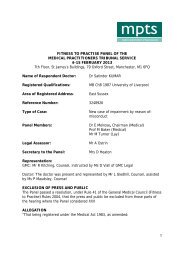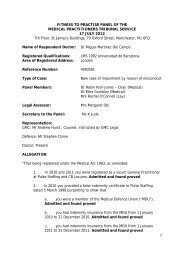PDF document
PDF document
PDF document
Create successful ePaper yourself
Turn your PDF publications into a flip-book with our unique Google optimized e-Paper software.
And that by reason of the matters set out above your fitness to practise<br />
is impaired because of your misconduct.”<br />
Determination on Rule 17(2)(g) application<br />
Mr Hyam:<br />
You have made an application on behalf of Dr Brier under Rule 17 (2) (g) of the<br />
General Medical Council (Fitness to Practise) Rules 2004 (the Rules) that insufficient<br />
evidence has been adduced to support a finding of impairment.<br />
You referred the Panel to the judgment of Lane LCJ in the criminal case of R v<br />
Galbraith [1981] 2 All ER 1039. His Lordship stated:<br />
Where the judge comes to the conclusion that the Crown evidence, taken at<br />
its highest, is such that a jury properly directed could not properly convict on it,<br />
it is his duty, on a submission being made, to stop the case.<br />
You submitted that it was appropriate to apply that approach to the current<br />
application, and that the evidence adduced in this case was such that, taken at its<br />
highest, a properly advised panel could not properly conclude that Dr Brier’s Fitness<br />
to practise is impaired by reason of his misconduct.<br />
You referred the panel to the cases of Calhaem [2007] EWHC 2606 (Admin),<br />
Cheatle [2009] EWHC 645 (Admin)and Nandi [2004] EWHC 2317 (Admin) and<br />
submitted that a properly advised panel would first be required to consider whether<br />
the matters found proved were sufficiently serious as to amount to misconduct for<br />
the purposes of impairment. You submitted that to be so serious they would have to<br />
be regarded as deplorable by other practitioners, and that the matters found proved<br />
in this case fall below that threshold. Accordingly, a properly advised panel would<br />
find that there was no misconduct and would not proceed further.<br />
You submitted that even if a panel were to conclude that the matters found proved<br />
were of sufficient seriousness as to constitute misconduct, and were therefore to<br />
proceed further, there was insufficient evidence to support a finding of impairment by<br />
reason of that misconduct. You reminded the panel that Dr Brier had admitted the<br />
matters concerned, that they were part of an isolated incident, that no patient had<br />
been put at risk, that evidence had been adduced that the Doctor had reflected on<br />
his wrongdoing and that it was most unlikely to be repeated.<br />
Mr Rankin, on behalf of the GMC, opposed your application on the ground that the<br />
evidence adduced is sufficient to support a finding of impairment. On the issue of<br />
seriousness, he reminded the panel that Dr Brier had admitted making inappropriate<br />
and unauthorised entries on the clinical notes and drug chart of a patient for whom<br />
he had no clinical responsibility. His actions were in breach of the GMC publication<br />
Good Medical Practice and of Section 6 c) of the GMC guidance <strong>document</strong> The New<br />
Doctor. Mr Rankin submitted that the evidence was such that a properly advised<br />
panel could properly find those actions to be sufficiently serious as to constitute<br />
misconduct for current purposes and that sufficient evidence had been adduced to<br />
2




